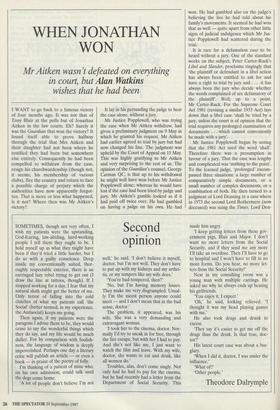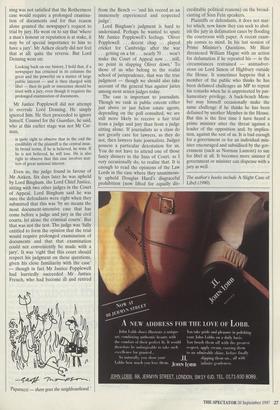WHEN JONATHAN WON
I WANT to go back to a famous victory of four months ago. It was not that of Tony Blair at the polls but df Jonathan Aitken in the law courts. Eh? Surely it was the Guardian that won the victory? It found itself able to prove halfway through the trial that Mrs Aitken and their daughter had not been where he testified they had been but somewhere else entirely. Consequently he had been compelled to withdraw from the case, resign his churchwardenship (though not, it seems, his membership of various clubs), flee the country and return to face a possible charge of perjury which the authorities have now apparently forgot- ten. That is more or less what happened, is it not? Where then was Mr Aitken's victory? It lay in his persuading the judge to hear the case alone, without a jury.
Mr Justice Popplewell, who was trying the case when Mr Aitken withdrew, had given a preliminary judgment on 9 May in which he granted his request. Mr Aitken had earlier agreed to trial by jury but had now changed his line. The judgment was upheld by the Court of Appeal on 15 May. This was highly gratifying to Mr Aitken and very surprising to the rest of us. The opinion of the Guardian's counsel, George Carman QC, is that up to his withdrawal he might well have won before Mr Justice Popplewell alone; whereas he would have lost if the case had been tried by judge and jury. Mr Aitken's gamble looked as if it had paid off twice over. He had gambled on having a judge on his own. He had won. He had gambled also on the judge's believing the lies he had told about his family's movements. It seemed he had won that as well — quite apart from other little signs of judicial indulgence which Mr Jus- tice Popplewell had scattered during the trial.
It is rare for a defamation case to be heard without a jury. One of the standard works on the subject, Peter Carter-Ruck's Libel and Slander, proclaims ringingly that `the plaintiff or defendant in a libel action has always been entitled to ask for and have a right to trial by jury and . . . it has always been the jury who decide whether the words complained of are defamatory of the plaintiff'. Well, up to a point, Mr Carter-Ruck. For the Supreme Court Act 1981 (revising a similar 1933 Act) lays down that a libel case 'shall be tried by a jury, unless the court is of opinion that the trial requires any prolonged examination of documents . . . which cannot conveniently be made with a jury'.
Mr Justice Popplewell began by noting that the 1981 Act used the word 'shall'. Therefore there was a presumption in favour of a jury. That the case was lengthy and complicated was 'nothing to the point'. To the learned judge, 'prolonged' encom- passed three situations: a large number of comparatively simple documents, or a small number of complex documents, or a combination of both. He then turned to a judgment of Lord Denning in a case where in 1973 the second Lord Rothermere (now deceased) was suing the Times. Lord Den- ning was not satisfied that the Rothermere case would require a prolonged examina- tion of documents and for that reason alone granted the newspaper's request to trial by jury. He went on to say that 'where a man's honour or reputation is at stake, it may be of special importance to him to have a jury'. Mr Aitken clearly did not feel that at all: quite the reverse. But Lord Denning went on:
Looking back on our history, I hold that, if a newspaper has criticised in its columns the great and the powerful on a matter of large public interest — and is then charged with libel — then its guilt or innocence should be tried with a jury, even though it requires the prolonged examination of documents.
Mr Justice Popplewell did not attempt to overrule Lord Denning. He simply ignored him. He then proceeded to ignore himself. Counsel for the Guardian, he said, who at this earlier stage was not Mr Car- man,
is quite right to observe that in the end the credibility of the plaintiff is the central issue. In broad terms, if he is believed, he wins. If he is not believed, he will lose. He is also right to observe that this case involves mat- ters of great national interest.
Even so, the judge found in favour of Mr Aitken. Six days later he was upheld by Lord Bingham, the Lord Chief Justice, sitting with two other judges in the Court of Appeal. Lord Bingham said he was sure the defendants were right when they submitted that this was 'by no means the most document-intensive case that has come before a judge and jury in the civil courts, let alone the criminal courts'. But that was not the test. The judge was 'fully entitled to form the opinion that the trial would require prolonged examination of documents and that that examination could not conveniently be made with a jury'. It was 'right that this court should respect his judgment on these questions, given his close familiarity with the case' — though in fact Mr Justice Popplewell had hurriedly succeeded Mr Justice French, who had become ill and retired `Paparazzi — there goes the neighbourhood.' from the Bench — 'and his record as an immensely experienced and respected judge'.
Lord Bingham's judgment is hard to understand. Perhaps he wanted to spare Mr Justice Popplewell's feelings. 'Oliver Popplewell . . . decent chap . . . played cricket for Cambridge after the war . . . getting on a bit . . . nearly 70 . . . won't make the Court of Appeal now . . . still, no point in slapping Oliver down.' To those of us who belong to the realist school of jurisprudence, that was the true judgment — though we should also take account of the general bias against juries among most senior judges today.
The case is important to journalists. Though we rank in public esteem either just above or just below estate agents, depending on the poll consulted, we are still more likely to receive a fair trial from a judge and jury than from a judge sitting alone. If journalists as a class do not greatly care for lawyers, as they do not, then lawyers hate journalists. Judges possess a particular detestation for us. You do not have to attend one of those fancy dinners in the Inns of Court, as I very occasionally do, to realise that. It is enough to read the opinions of the Law Lords in the case where they unanimous- ly upheld Douglas Hurd's disgraceful prohibition (now lifted for equally dis- creditable political reasons) on the broad- casting of Sinn Fein speakers.
Plaintiffs or defendants, it does not mat- ter which, now know they can seek to abol- ish the jury in defamation cases by flooding the courtroom with paper. A recent exam- ple comes to mind. In his last session of Prime Minister's Questions, Mr Blair threatened William Hague with an action for defamation if he repeated his — in the circumstances restrained — animadver- sions on Lord Simon of Highbury outside the House. It sometimes happens that a member of the public who thinks he has been defamed challenges an MP to repeat his remarks when he is unprotected by par- liamentary privilege. A back-bench Mem- ber may himself occasionally make the same challenge if he thinks he has been defamed by another Member in the House. But this is the first time I have heard a prime minister utter the threat against a leader of the opposition and, by implica- tion, against the rest of us. It is bad enough for a government or for an individual min- ister encouraged and subsidised by the gov- ernment (such as Norman Lamont) to sue for libel at all. It becomes more sinister if government or minister can dispense with a jury as well.
The author's books include A Slight Case of Libel (1990).



































































 Previous page
Previous page